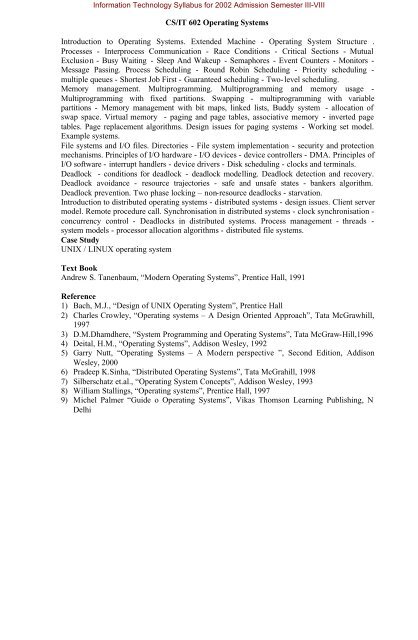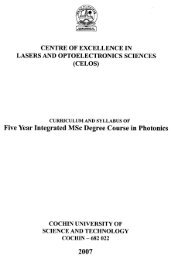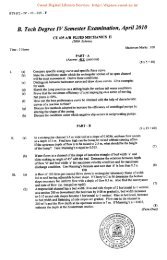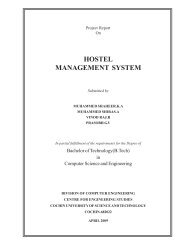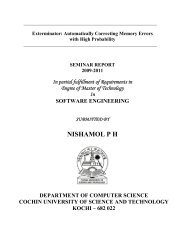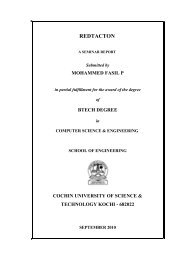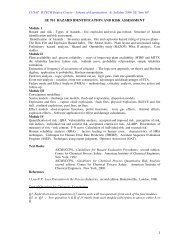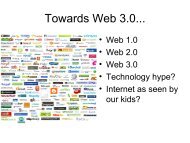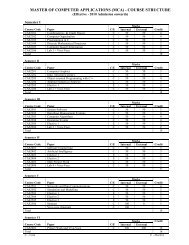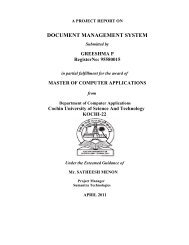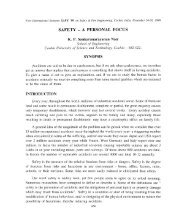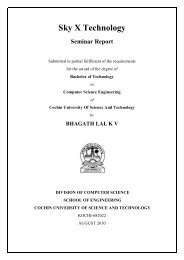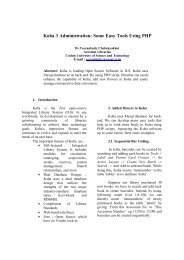Information Technology Syllabus for 2002 Admission Semester III
Information Technology Syllabus for 2002 Admission Semester III
Information Technology Syllabus for 2002 Admission Semester III
Create successful ePaper yourself
Turn your PDF publications into a flip-book with our unique Google optimized e-Paper software.
<strong>In<strong>for</strong>mation</strong> <strong>Technology</strong> <strong>Syllabus</strong> <strong>for</strong> <strong>2002</strong> <strong>Admission</strong> <strong>Semester</strong> <strong>III</strong>-V<strong>III</strong><br />
CS/IT 602 Operating Systems<br />
Introduction to Operating Systems. Extended Machine - Operating System Structure .<br />
Processes - Interprocess Communication - Race Conditions - Critical Sections - Mutual<br />
Exclusion - Busy Waiting - Sleep And Wakeup - Semaphores - Event Counters - Monitors -<br />
Message Passing. Process Scheduling - Round Robin Scheduling - Priority scheduling -<br />
multiple queues - Shortest Job First - Guaranteed scheduling - Two-level scheduling.<br />
Memory management. Multiprogramming. Multiprogramming and memory usage -<br />
Multiprogramming with fixed partitions. Swapping - multiprogramming with variable<br />
partitions - Memory management with bit maps, linked lists, Buddy system - allocation of<br />
swap space. Virtual memory - paging and page tables, associative memory - inverted page<br />
tables. Page replacement algorithms. Design issues <strong>for</strong> paging systems - Working set model.<br />
Example systems.<br />
File systems and I/O files. Directories - File system implementation - security and protection<br />
mechanisms. Principles of I/O hardware - I/O devices - device controllers - DMA. Principles of<br />
I/O software - interrupt handlers - device drivers - Disk scheduling - clocks and terminals.<br />
Deadlock - conditions <strong>for</strong> deadlock - deadlock modelling. Deadlock detection and recovery.<br />
Deadlock avoidance - resource trajectories - safe and unsafe states - bankers algorithm.<br />
Deadlock prevention. Two phase locking – non-resource deadlocks - starvation.<br />
Introduction to distributed operating systems - distributed systems - design issues. Client server<br />
model. Remote procedure call. Synchronisation in distributed systems - clock synchronisation -<br />
concurrency control - Deadlocks in distributed systems. Process management - threads -<br />
system models - processor allocation algorithms - distributed file systems.<br />
Case Study<br />
UNIX / LINUX operating system<br />
Text Book<br />
Andrew S. Tanenbaum, “Modern Operating Systems”, Prentice Hall, 1991<br />
Reference<br />
1) Bach, M.J., “Design of UNIX Operating System”, Prentice Hall<br />
2) Charles Crowley, “Operating systems – A Design Oriented Approach”, Tata McGrawhill,<br />
1997<br />
3) D.M.Dhamdhere, “System Programming and Operating Systems”, Tata McGraw-Hill,1996<br />
4) Deital, H.M., “Operating Systems”, Addison Wesley, 1992<br />
5) Garry Nutt, “Operating Systems – A Modern perspective ”, Second Edition, Addison<br />
Wesley, 2000<br />
6) Pradeep K.Sinha, “Distributed Operating Systems”, Tata McGrahill, 1998<br />
7) Silberschatz et.al., “Operating System Concepts”, Addison Wesley, 1993<br />
8) William Stallings, “Operating systems”, Prentice Hall, 1997<br />
9) Michel Palmer “Guide o Operating Systems”, Vikas Thomson Learning Publishing, N<br />
Delhi


